That call comes after the Minister for Environment, Energy and Rural Affairs Lesley Griffiths updated the National Assembly on Welsh Government’s Bovine TB Eradication Programme, which was launched 18 months ago.
While the Minister’s announcement pointed to a 5% decrease in the number of new herd incidents in Wales, a 12% increase in the number of cattle slaughtered in 2018 as a result of bovine TB is worrying, according to the union. NFU Cymru was also concerned to see the Welsh Government proposing a review of the current TB compensation regime in this afternoon’s statement.
NFU Cymru Deputy President Aled Jones, who went to Cardiff to hear the Minister deliver her statement to plenary, said: “It is 18 months since the Minister launched the refreshed Bovine TB Eradication Programme and Welsh farmers will be questioning whether we will ever be rid of this disease. To see 11,233 cattle slaughtered in 2018 – a 12% increase from the previous year – is completely unacceptable and in our view is not an indicator that this strategy is having a sufficient impact on this serious problem.
“While Welsh Government can point towards relative success in the Low TB Area in North West Wales, which is of course welcomed, this is of no consolation whatsoever to those based in the hotspots, both in High and some Intermediate areas, where bovine TB continues to cause untold stress and concern. We cannot forget that the facts and figures on spreadsheets and data dashboards do not truly reflect the level of suffering being experienced by farming families in many parts of Wales.
“The Minister’s statement alludes to the fact that we all need to work together to eradicate TB in Wales and while NFU Cymru agrees with this statement, the reality is that the approach to tackling bovine TB in Wales is not a ‘true’ partnership approach. Farmers are the ones bearing the financial costs through additional cattle controls and restrictions while the reservoir of disease in wildlife remains relatively untouched. The refreshed approach was supposed to address this issue but sadly it does not.
“We need only look over the border to England to see how an effective collaborative approach can be put in place to successfully tackle bovine TB. Defra has worked closely with the industry as part of the strategy in England, giving the NFU and farmers the confidence to prepare and submit licence applications. Preliminary figures suggest this is leading to a reduction of the disease in a number of those cull areas. We again urge the Minister to look at the effectiveness of the model adopted in England.
“The Minister’s statement today also makes reference to the ‘unsustainable’ levels of TB compensation paid to Welsh farmers and its cost to the public purse. Seeing this compensation branded as ‘unsustainable’ is particularly galling for farmers in Wales, when it is the Welsh Government’s failure to implement a holistic policy that effectively eradicates the disease in the first place that is making such compensation necessary. The best way to lower that £14m spend would be to introduce measures that tackle the disease across all vectors.
“The imposition of the severe interpretation skin tests and blood tests, while perhaps understandable from the disease control point of view, is devastating to many businesses who see their production base being taken from them and the consequential losses which are not compensated are massive to these businesses.
“If we are ever to live and farm in a country that is free of bovine TB we need to remove the politics and emotion from this debate and instead focus on the science – just as our neighbours have done in England and other parts of the world. NFU Cymru remains committed to working with Welsh Government in a true partnership approach that can see us work together to effectively tackle the disease in cattle, but also in the wildlife population as well.”
